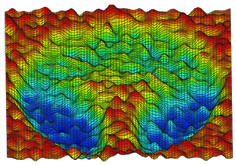Dallas Trinkle
 Mass Transport in Random Environments
Mass Transport in Random Environments
The processing of materials as well as their technologically important properties are controlled by a combination of thermodynamics—which determines equilibrium—and kinetics—how a material evolves. Mass transport in solids, where different chemical species diffuse in a material due to random motion with or without a driving force, is a fundamental kinetic process for a wide variety of materials problems. Even the new manufacturing technique of “additive manufacturing”—where metallic or ceramic materials are printed in three dimensions to simultaneously create complex shapes and graded chemical compositions—involves complex mass transport due to rapid heating and cooling of the part during processing.
Given the central role mass transport plays in material science and engineering, significant advances in predictive modeling will impact the development of materials for a wide array of applications. Recently, Professor Trinkle solved a significant problem in diffusion that now enables the development of new theoretical tools to greatly extend computational modeling of transport for complex materials. During his CAS research appointment, Professor Trinkle will work with mathematicians and scientists from across the world at the UCLA Institute for Pure and Applied Mathematics during a semester-long program on “Complex High-Dimensional Energy Landscapes.” He will also incorporate methods from advanced statistical mechanics to greatly extend our computational modeling tools. This will lead to significant new modeling capabilities with unprecedented accuracy and computational efficiency to computationally predict mass transport, capable of impacting the development of advanced alloys, battery materials, control of corrosion, and new processing methods.
